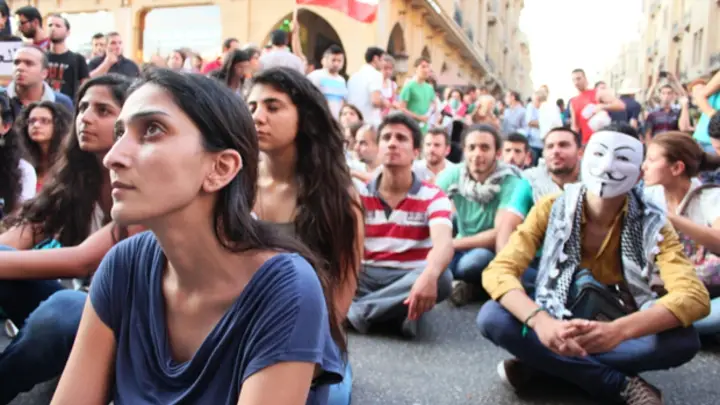The 15th of September is the International Day of Democracy. This time, we put the spotlight on Lebanon. Urban planner Sarah Saad works with youth organisations in Beirut to rebuild trust among young Lebanese people in the potential of their civic institutions, empowering the next generation to imagine and enact change.

Young people stage a protest in front of the Lebanese parliament in Beirut. Photo by: Mhamad Kleit / CC BY-NC-SA
Lebanon has a unique political system that ensures representation for its officially recognised religious communities, aiming to be an inclusive democracy that avoids sectarianism and conflict. But – as explained by Freedom House– its democratic health is hampered by corruption and a deterioration in the rule of law, while the country’s large population of refugees and migrant workers are restricted from employment, freedom of movement, and other basic rights.
In the last ten years, the Lebanese people have also been subject to a series of economic and social crises that have deteriorated the relationship between them and their government. This erupted in large-scale protests in 2019 and has only been exacerbated further by the Beirut port explosion in August 2020 and the social and economic instability brought on by the COVID-19 pandemic.
Marginalisation and Inclusivity
Sarah enrolled at The Hague Academy to deepen her understanding of citizen participation and inclusivity. The course’s focus on inclusion, particularly of marginalised groups, resonated strongly with her context in Lebanon, which is characterised by “gender- and age-based disparities in prioritising opinions and needs”, she explains, as well as a significant migratory and refugee population that is largely disenfranchised.
“I joined the course both as a citizen whose voice is often overlooked and as a professional humanitarian dedicated to fostering development projects in a context that greatly requires progress in these areas”.
As Sarah explains, citizen engagement remains pivotal for driving Lebanon’s development and recovery efforts, especially among youth and marginalised groups. These are also the same demographics that have most been affected by the country’s compounded crises.
While steps have been taken to include a wider array of actors in Lebanon’s development, for example in the Reform, Recovery and Reconstruction Framework proposed by local and international stakeholders, Sarah maintains that “this does not go far enough and citizens have expressed the need to be more involved, but the right expertise and tools for them to do so are lacking”.
Imagining a Sense of Place
As an urban planner, Sarah paid great attention to the discussion on ‘placemaking’ and how municipalities can effectively engage with and foster trust among marginalised and minority groups by involving them in local decisions that affect the places around them.
“Using this approach in projects and programmes, we’ve now seen youth take beautiful initiatives and engage with their municipalities to make their villages and cities a better place for everyone”, shares Sarah.
When youth see their voices and concerns taken seriously, they are more likely to remain engaged and interested in the democratic process throughout their lives. Not only can they imagine a sense of place, but also a sense of belonging in it.
Moving forward, Sarah plans to address the disparity between representation and inclusion, emphasising that representation does not inherently guarantee inclusion. Within her capacity, Sarah aims to enhance inclusive citizen participation in project design and execution at the civil society level. This is a two-fold plan which first sees the creation of a comprehensive citizen participation and inclusion policy to provide a framework for effective engagement; and second, the development of a citizen participation handbook to serve as a practical guide for the implementing team.
In Lebanon, local civil society organisations (CSOs) are representatives of local communities, but a lack of effective participation strategies makes it hard for them to convey the needs of local communities. Sarah adds that the added value of the participation of marginalised groups, and especially youth, “lies in their infusion of diverse perspectives, innovative ideas, and a long-term vision”. Their engagement would help foster trust and optimistic social change.
“While the path forward is ongoing, we are taking steps towards establishing a more participatory and inclusive society”, and Sarah remains confident.
Join our Citizen Participation & Inclusive Governance Course!
Interested in learning strategies and approaches to promote citizen participation in local governance? Join our Citizen Participation & Inclusive Governance course, taking place from 1 to 14 November 2023.
Related courses
We offer a diversity of courses throughout the year. Here are several other courses you might like.

